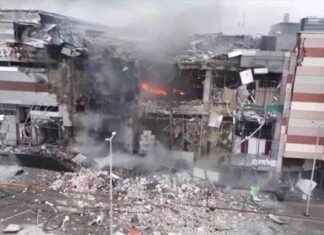The Galician election campaign started last night. Alfonso Rueda, the guardian of the longest absolute conservative majority on the Spanish political map, is fighting against emmurried Galicia. Last night Rueda put up the first poster in A Coruña together with popular spokesman Miguel Tellado, also Galician.
No one doubts that the PP will win the February 18 elections, but the key is whether it will manage to overcome the 38 seats that would guarantee it to continue in San Caetano, the seat of government in Santiago de Compostela.
Today the PP has 42 deputies, which Alberto Núñez Feijóo left as an inheritance two years ago before crossing the Ancares towards Moncloa, where he has not yet managed to reach.
Most polls predict 39-40 seats for Rueda. No one predicts that he can repeat the broad result achieved by the current leader of the PP in 2020 in an election marked by reasonable management of the pandemic and low turnout. 52% of the electorate stayed at home four years ago.
The results of these elections transcend the Galician struggle and are particularly important for the leader of the PP, Alberto Núñez Feijóo. If Rueda does not obtain an absolute majority, the formation of an alternative coalition government headed by the second force in the fray, the Galician Nationalist Bloc (BNG), is foreseeable.
Its leader, Ana Pontón, is the most highly rated politician in the polls, and the party has made the most progress in the local and regional elections.
The BNG could join forces with the Partit dels Socialistes de Galicia (PSdG) of José Ramón Gómez Besteiro, to which perhaps the candidate of Sumar, Marta Lois, could be added, if he gets representation – most polls rule this out.
This result, difficult, but not impossible, would be a bad step for Feijóo, because in practice it would add another defeat like the one on July 23. He would win the election, but lose the government, this time in his own camp.
And even more relevant: the eviction of the PP from the headquarters of San Caetano would be a challenge to its strategy, which now happens to block any meeting point with the parties that do not have headquarters in Madrid and an unequivocal compression of Spain.
On the contrary, Pedro Sánchez has a lot to gain and little to lose in these elections. His candidate, Gómez Besteiro, aspires, at best, to third place. With a slightly better result than that of 2020 – it currently has 14 deputies – it seems that it would already be satisfied. Low expectations. But, if Pontón reaches the presidency in a coalition, it would reinforce the strategy of the PSOE, the alliance with peripheral Spain on which Sánchez has built most of the investiture.
“Riquiña Galicia against Murmuriada Galicia”. On Tuesday, Alfonso Rueda, a calm man who finds it difficult to match the vehemence of his predecessor, at an event in Pontevedra, where he lives – specifically, on Calle Perfecto Feijóo – described with these words the battle that begins today.
Riquiña is a Galician word that could be translated as kind, affectionate. Murmured Galicia is the Galicia of the mess. The PP wants to persuade Galicians that the coalition of the Socialist Party and the Galician Nationalist Bloc, the main adversary, is the branch of Bildu, ERC, Puigdemont and, of course, Pedro Sánchez.
The weak point of this speech is that the whole world is dumb. And Galicia too. Beyond the plausibility of the seat projections of the Center for Sociological Research, the pre-electoral survey of the public institute published last week on a sample of 11,000 interviews indicates that the main concerns of Galicians revolve around unemployment, health , deindustrialization, depopulation or aging.
A list of concerns of its own in which the word amnesty does not even appear. Besteiro and, singularly, Ana Pontón, will try to impose this agenda on the electoral narrative of the next fortnight.
“We will talk about Galicia. There is a party”, the Bloc’s campaign team point out, hopeful. Both the PSdG and the BNG are clear that, if they manage to increase participation above the 48% of 2020, there is a possibility of doubling the absolute majority of the PP, although it is true that Feijóo’s first two victories took place with participation electoral votes that were above 60%. And they were resounding.
On Saturday, Alfonso Rueda and Alberto Núñez Feijóo will fill the Pontevedra bullring with supporters of the candidacy. The next day, SOS Sanidade Pública, an organization that is apparently not linked to the opposition, will try to fill the square of the Obradoiro de Santiago in support of the demands of the exhausted Galician public health workers. Besteiro, Pontón and Lois will be there, supporting them. Silly Galicia.








